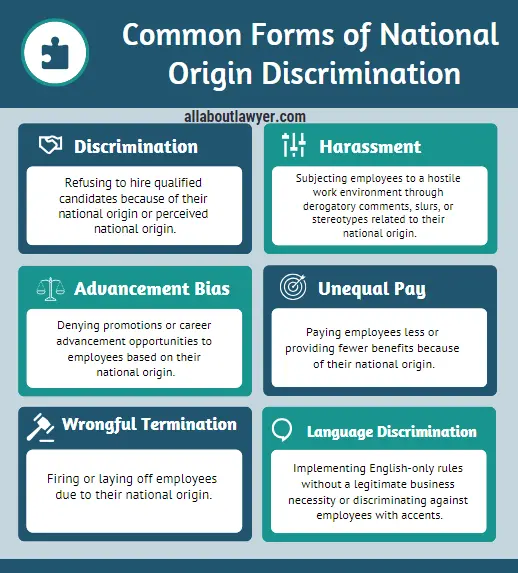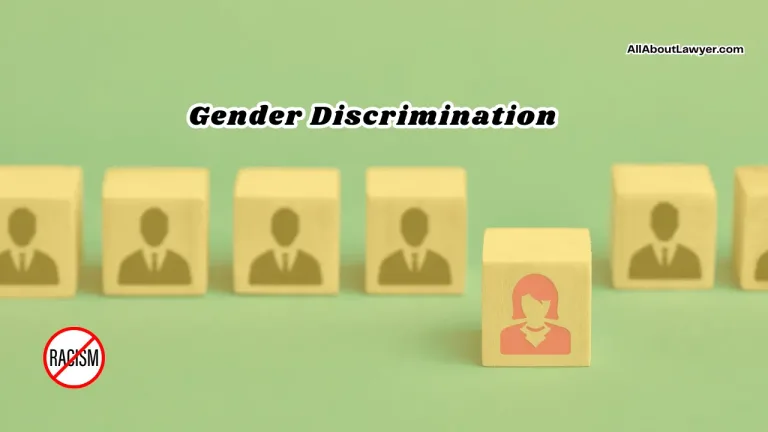National Origin Discrimination Attorney for Employment Justice
In today’s diverse and globalized workforce, the issue of national origin discrimination remains a significant concern. Employees from various cultural backgrounds and nationalities contribute to the rich tapestry of our workplaces, yet many still face unfair treatment based on their heritage or place of birth. This article delves into the crucial role of national origin discrimination attorneys in protecting the rights of workers and fostering equal opportunity in employment.
Table of Contents
What is National Origin Discrimination?
National origin discrimination occurs when an employer treats an employee or job applicant unfavorably because of their country of origin, ethnicity, accent, or appearance associated with a particular national origin. This form of discrimination is illegal under federal law, specifically Title VII of the Civil Rights Act of 1964, as well as various state and local statutes.
The Role of a National Origin Discrimination Attorney
A national origin discrimination attorney, also known as an employment discrimination lawyer or civil rights attorney, specializes in representing individuals who have experienced unfair treatment in the workplace due to their national origin. These legal professionals play a crucial role in:
1. Advising clients on their rights under federal and state anti-discrimination laws
2. Investigating claims of national origin discrimination
3. Filing complaints with the Equal Employment Opportunity Commission (EEOC)
4. Negotiating settlements with employers
5. Representing clients in court if a lawsuit becomes necessary
Common Forms of National Origin Discrimination
National origin discrimination can manifest in various ways in the workplace. Some common examples include:
1. Hiring Discrimination:
Refusing to hire qualified candidates because of their national origin or perceived national origin.
2. Harassment:
Subjecting employees to a hostile work environment through derogatory comments, slurs, or stereotypes related to their national origin.
3. Promotion and Advancement Bias:
Denying promotions or career advancement opportunities to employees based on their national origin.
4. Unequal Pay:
Paying employees less or providing fewer benefits because of their national origin.
Firing or laying off employees due to their national origin.
6. Language Discrimination:
Implementing English-only rules without a legitimate business necessity or discriminating against employees with accents.
7. Cultural Practice Discrimination:
Prohibiting or penalizing employees for observing cultural practices associated with their national origin.

Legal Protections Against National Origin Discrimination
Several federal, state, and local laws protect employees from national origin discrimination. The primary federal law is Title VII of the Civil Rights Act of 1964, which applies to employers with 15 or more employees. Additionally, many states and municipalities have their own civil rights statutes that may offer broader protections or apply to smaller employers.
The Role of the EEOC
The Equal Employment Opportunity Commission (EEOC) is the federal agency responsible for enforcing federal anti-discrimination laws. Before filing a lawsuit, employees generally must file a charge of discrimination with the EEOC. A national origin discrimination attorney can assist in this process, helping to ensure that the charge is filed correctly and within the required time limits.
Steps to Take if You Experience National Origin Discrimination
If you believe you have been subjected to national origin discrimination in the workplace, consider taking the following steps:
1. Document the incidents: Keep a detailed record of discriminatory actions, including dates, times, locations, and witnesses.
2. Report the discrimination: Follow your employer’s internal complaint procedures, if any exist.
3. Consult an attorney: Seek advice from a national origin discrimination attorney to understand your rights and options.
4. File an EEOC charge: Your attorney can help you file a charge with the EEOC or your state’s fair employment practices agency.
5. Participate in the investigation: Cooperate fully with any investigations conducted by your employer or the EEOC.
6. Consider legal action: If the EEOC issues a “right to sue” letter, you may file a lawsuit in federal court.
The Importance of Legal Representation
Navigating the complexities of national origin discrimination claims can be challenging. A skilled national origin discrimination attorney brings several advantages:
1. Legal Expertise: They possess in-depth knowledge of federal and state anti-discrimination laws.
2. Case Evaluation: They can assess the strength of your case and advise on the best course of action.
3. Evidence Gathering: Attorneys know how to collect and preserve evidence crucial to proving discrimination.
4. Negotiation Skills: They can negotiate with employers to reach favorable settlements.
5. Courtroom Experience: If a lawsuit is necessary, they can provide strong representation in court.
Proving National Origin Discrimination
Establishing a case of national origin discrimination typically requires demonstrating that:
1. You are a member of a protected class (based on your national origin).
2. You were qualified for your position or the position you applied for.
3. You suffered an adverse employment action (e.g., termination, demotion, failure to hire).
4. The circumstances suggest that the adverse action was motivated by discrimination.
An experienced national origin discrimination attorney can help gather and present evidence to support these elements.
Remedies for National Origin Discrimination
If national origin discrimination is proven, various remedies may be available, including:
1. Reinstatement to your job
2. Back pay and front pay
3. Compensatory damages for emotional distress
4. Punitive damages (in cases of intentional discrimination)
5. Attorney’s fees and court costs
6. Injunctive relief (requiring the employer to take specific actions to prevent future discrimination)
Preventing National Origin Discrimination in the Workplace
Employers play a crucial role in preventing national origin discrimination. Some best practices include:
1. Implementing clear anti-discrimination policies
2. Providing diversity and inclusion training
3. Establishing fair hiring and promotion practices
4. Creating a diverse and inclusive work environment
5. Promptly addressing and investigating discrimination complaints

The Broader Impact of Combating National Origin Discrimination
Fighting against national origin discrimination goes beyond individual cases. It contributes to:
1. Creating more inclusive workplaces
2. Promoting diversity in leadership positions
3. Fostering innovation through diverse perspectives
4. Improving employee morale and productivity
5. Enhancing a company’s reputation and attracting top talent
Conclusion
National origin discrimination has no place in today’s diverse workforce. National origin discrimination attorneys play a vital role in protecting employees’ rights, ensuring equal opportunities, and fostering inclusive work environments. If you believe you have experienced discrimination based on your national origin, seeking the guidance of an experienced attorney can help you understand your rights and pursue appropriate legal action.
By standing up against national origin discrimination, we contribute to creating fairer, more equitable workplaces that benefit everyone. Remember, every employee deserves to be judged on their merits and contributions, not on their national origin or cultural background.
FAQs
What is the difference between national origin discrimination and race discrimination?
While national origin discrimination and race discrimination can sometimes overlap, they are distinct concepts. National origin discrimination focuses on treating someone unfavorably because of their country of birth, ancestry, culture, or linguistic characteristics common to a specific ethnic group. Race discrimination, on the other hand, involves unfair treatment based on an individual’s race or physical characteristics associated with race. Both forms of discrimination are prohibited under federal law.
Can an employer implement English-only rules in the workplace?
Employers can implement English-only rules, but only if there is a legitimate business necessity for such a policy. The rule must be narrowly tailored to address specific circumstances where English proficiency is essential for safety or efficient business operations. Blanket English-only policies that are not justified by business necessity may be considered discriminatory.
Is it legal for employers to ask about an applicant’s national origin during the hiring process?
Generally, employers should avoid asking direct questions about an applicant’s national origin during the hiring process. Such questions may be viewed as evidence of discriminatory intent. However, employers can ask if an applicant is legally authorized to work in the United States, as this is a requirement for employment.
Visit All About Lawyer For more Articles.
About the Author

Sarah Klein, JD, is a former employment attorney who has advised clients on wrongful termination, workplace discrimination, wage disputes, and employee rights. At All About Lawyer, she writes practical, legally sound guides to help workers understand labor laws and stand up for fair treatment at work.
Read more about Sarah
